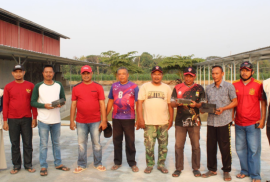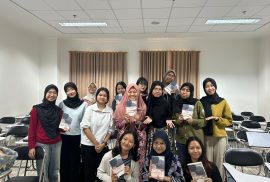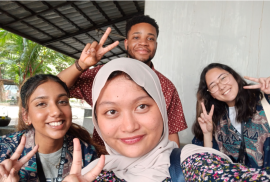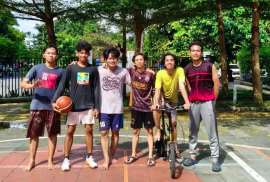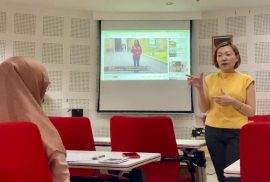Cirebon, 27/7/2025 – As part of their community engagement initiative, students from Universitas Gadjah Mada’s Community Service and Empowerment Learning Program (KKN-PPM) carried out a waste management program in Getrakmoyan Village, Pangenan District, Cirebon Regency, West Java. The program, titled “Eco Paving Education for a Sustainable Environment,” aims to address plastic pollution through practical, community-based solutions.
This interdisciplinary initiative brought together Anisah A’bidah, a student from the Arabic Study Program, Faculty of Cultural Sciences (Social Sciences track), and Sandhi Vardhana Rally, a student from the Civil Engineering Program, Faculty of Engineering (Science and Technology track). Conducted on July 19 and 26, 2025, the program empowered local communities through a hands-on workshop on producing environmentally friendly paving blocks made from recycled plastic waste. The main beneficiaries were the village government and the local Village-Owned Enterprise (BUMDes), identified as key partners for ensuring the program’s sustainability.
The project began with a survey to map the potential and volume of plastic waste in the area, providing a foundation for developing technical training materials and implementation strategies. The team then collaborated with local leaders and BUMDes representatives to finalize the execution plan. All necessary tools and materials — including used drums, firewood, and plastic waste — were sourced independently by the team, while the paving molds were purchased by the students to support the production process.
The program received a warm welcome from Getrakmoyan Village Head, Mr. Junandi, who praised the initiative as both innovative and unprecedented in the village. “We greatly appreciate this activity, which offers practical benefits and could become a long-term solution to our plastic waste problem. We hope the results can not only be used for public facilities but also be developed further by the village or BUMDes as a viable economic product,” he stated.
With strong community involvement and institutional support from the village government, the project is expected to serve as a sustainable waste management model at the local level. Furthermore, this initiative contributes directly to the realization of several Sustainable Development Goals (SDGs), particularly SDG 11: Sustainable Cities and Communities, SDG 12: Responsible Consumption and Production, and SDG 17: Partnerships for the Goals.
Through collaboration, education, and innovation, UGM students are helping communities turn waste into opportunity — creating not only paving blocks, but also pathways toward a more sustainable future.
Author: Anisah A’bidah

